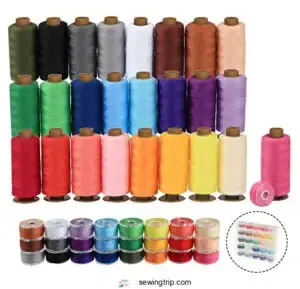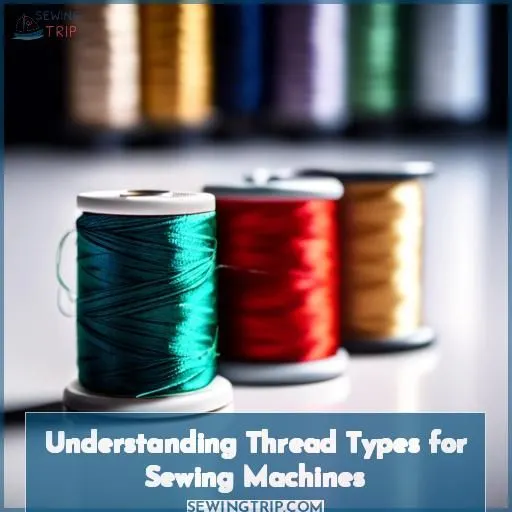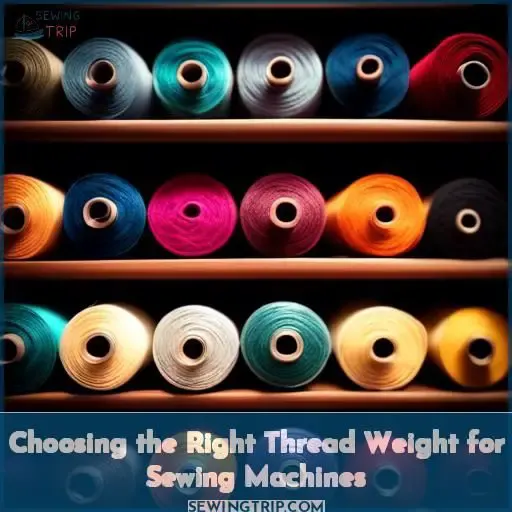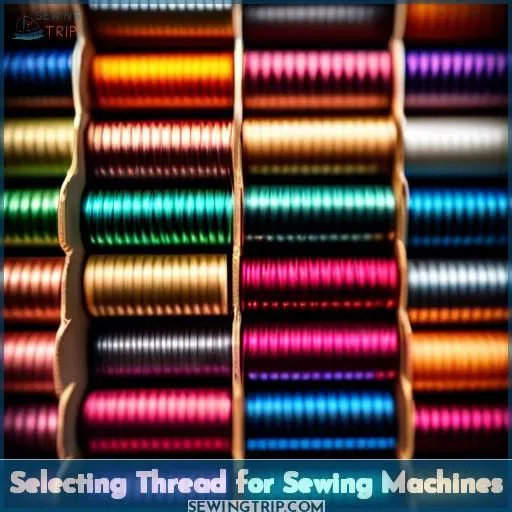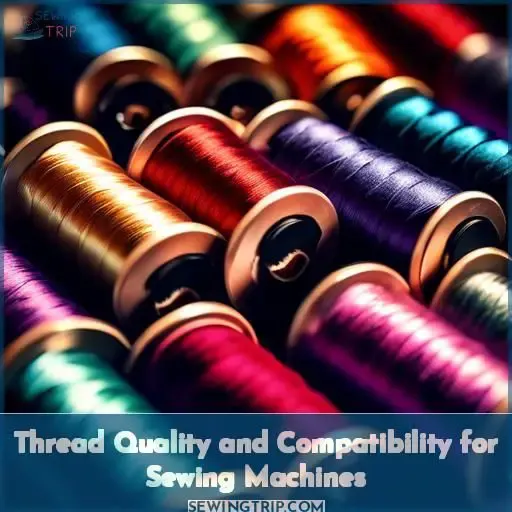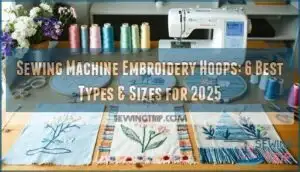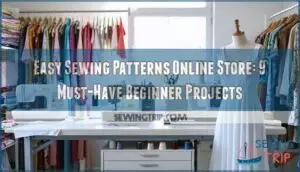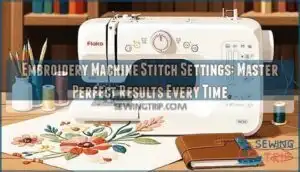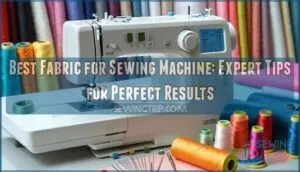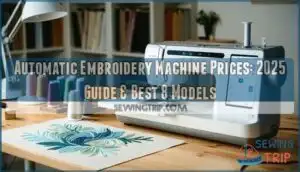This site is supported by our readers. We may earn a commission, at no cost to you, if you purchase through links.
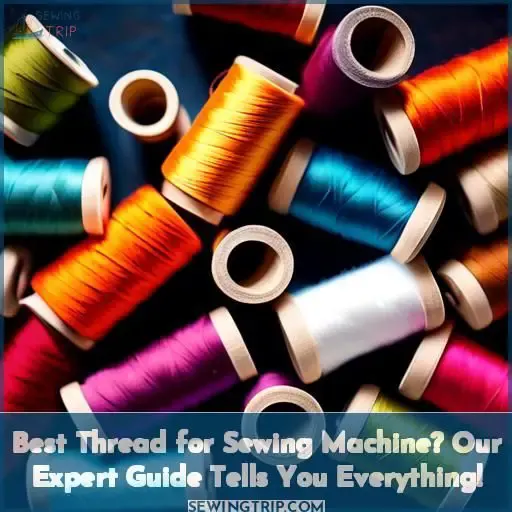
For your sewing machine, select high-grade polyester or cotton-reinforced polyester thread.
These superior threads for sewing machines resist abrasion, stretch sparingly, and possess ample strength to prevent seam failure or wrinkling.
Consistently choose the suitable weight – lighter 50-60wt for routine sewing, heavier 30-40wt for denim/upholstery.
Coordinate thread with your fabric: utilize all-purpose for the majority of woven fabrics, polyester for synthetic or active wear.
Considering machine compatibility, needle gauge, and intended application guarantees efficient performance.
To truly master thread selection, you’ll want to dive deeper into…
Table Of Contents
Key Takeaways
- Choose high-grade polyester or cotton-reinforced polyester thread for sewing machines to resist abrasion, stretch sparingly, and possess ample strength.
- Select a suitable thread weight, such as lighter 50-60wt for routine sewing and heavier 30-40wt for denim/upholstery.
- Coordinate thread with your fabric: utilize all-purpose for the majority of woven fabrics, polyester for synthetic or activewear.
- Consider machine compatibility, needle gauge, and the intended application to ensure efficient performance.
Top 4 Threads for Sewing Machines
You’re searching for the perfect threads to use with your sewing machine, and our expert guide has the top 4 recommendations – Livingo Premium Tailor Scissors Heavy Duty, Prewound Bobbins Sewing Thread Spools, Clover Water Soluble Colored Pencils, and Gutermann Sew-All Thread Black 110 Yards. These threads offer superior quality, durability, and compatibility with various sewing machines, ensuring your projects turn out flawless.
1. Livingo Premium Tailor Scissors Heavy Duty
Livingo Premium Tailor Scissors Heavy Duty are an indispensable tool for any sewing enthusiast.
These scissors are engineered for durability and strength, featuring a corrosion-resistant stainless steel blade that surpasses the hardness of regular stainless steel threefold.
They’re versatile and suitable for various sewing activities, including sewing, tailoring, quilting, dressmaking, pattern cutting, alterations, handicrafts, home and office applications, and more.
The multicolored titanium coating on the blades delivers a razor-sharp cutting edge capable of effortlessly slicing through over 16 layers of fabric.
The ergonomic design guarantees precise control and optimal comfort, rendering them suitable for both demanding and intricate tasks.
Backed by a lifetime warranty, these scissors represent a judicious investment for any sewing machine user.
Best For: Sewing enthusiasts and professionals seeking durable, high-performance scissors.
- Exceptionally strong and durable stainless steel blades
- Multi-colored titanium coating for enhanced sharpness
- Ergonomic design for precise control and comfort
- Not specified
- Not specified
- Not specified
2. Prewound Bobbins Sewing Thread Spools
Prewound bobbins are a popular option for sewing machine users because of their convenience and efficiency. They come pre-wound with thread, eliminating the need to wind bobbins manually. This can save time and reduce the risk of tension issues or skipped stitches. Prewound bobbins are usually made of high-quality thread and can hold more thread than self-wound bobbins, allowing for longer sewing sessions without the need to change bobbins.
When selecting prewound bobbins, consider the compatibility with your sewing machine. Many machines are compatible with standard L size prewound bobbins, which are widely available. It’s important to check that the thread quality is good, as prewound bobbins can vary in quality depending on the supplier.
Some sewing machine models may not be compatible with prewound bobbins, so it’s essential to consult the manufacturer’s recommendations. If you’re unsure, it’s best to consult with a sewing expert or the manufacturer for advice on the best thread and bobbin options for your specific machine.
Best For: Sewing machine users who value convenience and efficiency.
- Pre-wound for convenience and time-saving.
- High-quality thread for durability and reduced breakage.
- Comes with a clear bobbin case for easy thread monitoring.
- May not be compatible with all sewing machines.
- Can be difficult to find the end of the thread on some spools.
- Slightly more expensive than self-wound bobbins.
3. Clover Water Soluble Colored Pencils
 View On Amazon
View On Amazon
Clover Water Soluble Colored Pencils are a versatile tool for marking on various fabrics.
These pencils are perfect for sewing, quilting, and other fabric projects. They come in a set of three pencils in blue, pink, and white, providing a range of colors to suit different fabric types.
The pencils are easily wiped off with water, making them convenient for marking fine lines and details. To remove the markings, place a dry towel or cloth underneath your project and wet a cloth or towel to gently wipe off the markings.
It’s crucial to try the pencil marker with a piece of the same fabric before using it on your project to ensure the markings can be easily erased.
Clover Water Soluble Pencils are non-toxic and made of clay, wax, and pigment, with a natural wood cap and polystyrene core. They’re suitable for precise markings and can be sharpened using a small pencil sharpener.
Best For: Seamstresses, quilters, and fabric crafters seeking a versatile and easy-to-remove marking tool.
- Easy to wipe off with water
- Available in three colors (blue, pink, and white)
- Suitable for precise markings
- Soft lead may break easily
- Blue markings may not completely remove after washing
- May drag on certain fabrics
4. Gutermann Sew-All Thread Black 110 Yards

Regarding threading your sewing machine, the Gutermann Sew-All Thread Black 110 Yards is akin to the multi-purpose tool in your sewing kit.
This versatile thread is crafted from premium polyester, making it ideal for both natural and synthetic fibers.
Its robust nature ensures the elimination of fiber lint and seam distortion.
Envision sewing with a thread that glides effortlessly through fabric, resulting in durable, abrasion-resistant seams.
Whether repairing jeans or creating a new garment, this thread provides unwavering support.
Moreover, with an ample supply of 660 yards, you can embark on extended sewing endeavors.
It’s a thread that continuously delivers, enhancing the significance of every stitch.
Best For: All-purpose hand and machine sewing on natural and synthetic fibers
- Guarantees optimal sewing without fiber lint and seam crimping
- Strong and durable seams due to high tear and abrasion resistance
- Ample supply of 660 yards
Understanding Thread Types for Sewing Machines
When selecting thread for your sewing machine, you’ll want to understand the various fiber types available: natural fibers like cotton, wool, silk, and linen; synthetic fibers such as polyester, rayon, and nylon; and blends like cotton polyester. There are also specialized threads designed for specific purposes, including elastic, heavy-duty, all-purpose, embroidery floss, and metallic thread.
Natural Fibers: Cotton, Wool, Silk, Linen
Natural fibers, such as cotton, wool, silk, and linen, have a rich history in sewing.
Linen thread was commonly used in the late 1800s and early 20th century.
These fibers offer durability and strength, making them suitable for various sewing projects.
Linen thread, in particular, is known for its natural aesthetic and can be found in a range of colors to complement your fabric choices.
Natural fiber blends, like cotton polyester, provide a balance between natural and synthetic fibers for versatile sewing needs.
Synthetic Fibers: Polyester, Rayon, Nylon
Synthetic fibers are a popular choice for sewing machines due to their durability and versatility. Here are three options to explore:
- Polyester: Known for its resistance to bleach and ability to handle abrasion, mildew, and most chemicals it encounters. Polyester is suitable for most projects and can be used in various applications, including edge-to-edge quilting, piecing, or other structural purposes.
- Rayon: This material has a natural gloss that carries across the stitching or embroidery, making it a beautiful choice for decorative purposes such as appliqué or decorative quilting. Rayon is soft to the touch and maintains its softness even when stitch counts are high. It’s a popular choice for projects that won’t be subjected to a lot of washing and handling.
- Nylon: With a breaking strength of approximately 11 lbs, nylon allows for smooth stitching in heavy fabrics and confident use in heavy-duty situations. It’s also known for its high tensile strength and resistance to mildew, aging, and abrasion. Nylon is ideal for heavy-duty clothing repairs, mending household items, and various arts and crafts projects.
When selecting synthetic fibers, consider the thread compatibility with your sewing machine and the specific requirements of your project. Polyester, rayon, and nylon each have their unique qualities and benefits, so choose the one that best suits your needs.
Blends: Cotton Polyester
Blends are a popular choice for sewing thread, combining the best of both worlds: natural and synthetic fibers.
Cotton polyester blends are a common option, offering a balance between the strength of polyester and the natural look of cotton.
These blends are suitable for various projects and can be found in different thread weights, making them versatile for a range of fabrics.
When selecting cotton polyester blends, consider the fiber content, thread weight, and compatibility with your sewing machine and needle to guarantee a successful sewing experience.
Specialized Threads: Elastic, Heavy-Duty, All-Purpose, Embroidery Floss, Metallic Thread
Regarding specialized threads for sewing machines, there are several choices to explore. Here are some of the most prevalent types:
- Elastic Thread: Perfect for sewing elastic bands or creating stretchy seams. It’s vital to select a thread that can withstand the stretch without breaking.
- Embroidery Floss: Often made of cotton or polyester, embroidery floss is used for hand embroidery and decorative stitching. Look for high-quality floss with good colorfastness for enduring results.
- Metallic Thread: Used for embellishing clothing, accessories, and home decor, metallic threads add a touch of glamour. They can be more difficult to work with, so choose a thread with a smooth texture and good tension control.
- Heavy-Duty Thread: For sewing thick fabrics or heavy-duty projects, a strong thread is essential. Look for threads with high tensile strength and good resistance to wear and tear.
- All-Purpose Thread: Versatile and suitable for a wide range of projects, all-purpose threads are a mainstay in any sewer’s collection. They’re available in various weights and colors, making them a practical choice for many applications.
Choosing the Right Thread Weight for Sewing Machines
When selecting thread for your sewing machine, understanding thread weight is essential. The weight number corresponds to the thread’s thickness—a higher number indicates a thinner thread, while fractions like 50/3 signify weight and ply (three-ply in this case). Typically, a 40-weight thread is recommended for embroidery and decorative stitches, while serger threads are often 40-weight polyester coated for high-speed performance.
Higher Weight Number = Thinner Thread
In the realm of sewing, the golden rule prevails: a higher numerical designation signifies a finer thread.
It’s akin to the sewing machine’s adage that less is more.
Whether embarking on intricate embroidery or propelling a serger at its zenith, unraveling this enigmatic matter can determine the fate of your project.
Thus, bear in mind, regarding thread gauge, higher denotes thinner.
Fraction Weight (e.g., 50/3) Indicates Weight and Ply
Regarding thread weight, the fractional weight (e.g., 50/3) is a vital aspect to evaluate.
This value represents the thread’s thickness and strands. The greater the first number, the finer the thread. The second number signifies the thread’s strands, which can be single, double, or triple.
For instance, a 50/3 thread is a single-strand thread that’s thinner than a 40/3 thread. Grasping these values assists in selecting the appropriate thread thickness for your sewing endeavor.
40 Weight: Embroidery, Decorative Stitches
With regard to embroidery and decorative stitches, 40 weight thread is the optimal selection.
This type of thread is usually constructed from either rayon or polyester.
It is recognized for its luster and chromatic options.
It’s appropriate for machine embroidery undertakings and can be employed for applique as well.
Nevertheless, it’s essential to acknowledge that 40 weight thread can be somewhat more substantial than other types.
It may not be appropriate for all sewing machines.
It’s advisable to utilize an embroidery needle with a capacious eye.
A distinctive scarf should be used to avert thread breaks when sewing with 40 weight thread.
Serger Thread: 40 Weight Polyester With Coating for High Speeds
Seeking the optimal thread for your serger? Cease your search with 40 weight polyester coated for rapid speeds.
This thread is meticulously crafted to withstand the amplified velocity and tension of a serger, guaranteeing a frictionless and flawless sewing encounter.
Pfaff, for instance, recommends employing a 40 weight polyester thread for their sergers, which can handle high speeds without encountering difficulties.
Hence, whether you’re engaged in a swift undertaking or a more protracted one, this thread stands as an exceptional option for your serger.
Selecting Thread for Sewing Machines
When selecting thread for your sewing machine, go for an all-purpose thread that offers good quality and a wide color selection, or choose a durable polyester thread suitable for most projects. For lightweight or heavyweight fabrics, opt for specialized threads designed to handle the unique characteristics of those materials.
All-Purpose Thread: Good Quality, Wide Color Selection
Regarding thread selection for your sewing machine, all-purpose thread is a versatile choice.
It offers both good quality and a wide range of color options.
This type of thread is suitable for various projects and fabric types.
It ensures durability and compatibility with your sewing machine.
By selecting all-purpose thread, you can enjoy the flexibility to create a diverse range of sewing projects with ease.
Polyester Thread: Durable, Suitable for Most Projects
After covering the versatile all-purpose thread, let’s reel in polyester thread. Its durability makes it a catch for most projects, without costing an arm and a leg. With a weight that holds up under pressure and a color selection that rivals a rainbow, brands offer polyester thread that’s both durable and suitable, ensuring your creations withstand the test of time.
Specialized Thread for Lightweight or Heavyweight Fabrics
In the realm of sewing, the selection of thread is paramount.
For delicate fabrics, consider specialized threads such as bonded thread or waxed thread.
These threads excel in flexibility and strength, ensuring the longevity of your project.
Conversely, for robust fabrics, a heavier thread like linen thread or a dedicated heavy-duty thread may be more appropriate.
The crux lies in aligning the thread weight with the fabric weight and the nature of the project.
Thread Quality and Compatibility for Sewing Machines
When selecting thread for your sewing machine, quality and compatibility are paramount. You want a smooth thread that resists friction and has some stretch, is strong enough to hold seams without breaking or causing puckering, is compatible with your machine and needle size, and is appropriate for the type of fabric and project you’re working on.
Smooth, Resists Friction, Has Stretch
To guarantee a seamless sewing experience, your thread should endure friction and possess some elasticity. Here are three fundamental aspects to ponder:
- Thread color: Opt for a color that harmonizes with your fabric and project. Test it on a remnant fabric piece initially to ascertain its resistance to fading.
- Thread storage: Preserve your thread in a cool, dry environment, shielded from sunlight and moisture. Wind it onto spools or cones to avert entanglements.
- Thread brands: Experiment with various brands to locate the optimal compatibility with your sewing machine and needle. Contemplate brands such as Brother Pacesetter, Floriani, Metro, Robison Anton, Madeira, and Superior Thread.
Strong Enough to Hold Seams
Regarding thread strength, it’s crucial to select a thread capable of maintaining seams securely and enduring the rigors of sewing.
Seek out threads with sufficient strength to accommodate the weight and thickness of your fabric, as well as the stitch pattern you intend to use.
Evaluate factors such as thread compatibility with your sewing machine and needle, as well as the thread’s durability for lasting seams.
Some prevalent choices for robust thread include polyester, cotton, and nylon, while specialized threads like elastic and heavy-duty are also available for particular projects.
Should Not Break or Cause Puckering
To guarantee your sewing machine thread doesn’t break or cause puckering, consider these four key factors:
- Thread Durability: Choose threads that are sturdy enough to hold seams and resistant to friction.
- Thread Strength: Opt for threads that can withstand the stress of sewing without breaking.
- Thread Aesthetics: Select threads that complement your fabric and create the desired look for your project.
- Thread Quality and Compatibility: Ensure the thread is compatible with your sewing machine and needle, and that it doesn’t cause lint or other issues.
Compatible With Sewing Machine and Needle
Choosing the right thread isn’t just about picking a color that matches your fabric.
It’s about ensuring thread compatibility with your machine and needle.
Superior thread brands like Cowboy and A&E offer durability that won’t let you down mid-seam.
For Adler 30 series patchers, consider thread quality that can handle the top tension adjustment nut and take-up adjustment device without a hitch.
Appropriate for Fabric and Sewing Project
Selecting the appropriate thread for your sewing machine is essential for achieving optimal outcomes in your endeavors. Here are some recommended practices to guarantee thread alignment with your fabric and sewing project:
- Consider Fabric Compatibility: Natural fibers such as cotton, wool, silk, and linen are ideally suited for natural fabrics, while synthetic fibers like polyester, rayon, and nylon are suitable for all fabric types.
- Match Thread Size: Thicker thread for more substantial fabrics and seams, thinner thread for lighter fabrics and delicate seams.
- Quality Assessment: Look for threads that are smooth, resistant to friction, have elasticity, and are robust enough to hold seams. Ensure compatibility with your sewing machine and needle.
Remember to refer to a color chart for the chosen thread brand to cross-check with the initial design colors. Brands like A&E, Superior Thread, and Cowboy offer a vast assortment of colors that match across different thread sizes.
Frequently Asked Questions (FAQs)
How does humidity affect sewing thread quality?
Excessive humidity can cause sewing thread to swell and weaken over time. You’ll want to store your thread properly in an airtight container to prevent moisture absorption. A dehumidifier in your sewing space also helps protect thread quality.
Can old thread damage sewing machines?
Yes, old thread can absolutely wreak havoc on your machine. It gets brittle over time and is prone to snapping or shredding, leaving nasty lint buildup that’ll clog things up quicker than you can say bobbin jam.
Is there a difference in thread brands’ durability?
Like a sturdy thread in a fine tapestry, brand durability varies – some offer unparalleled strength, resisting snags and frays, while others may disappoint, breaking under tension. Savvy sewists sample different quality threads to find their perfect match.
How to properly dispose of unused sewing thread?
Don’t toss unused thread! Neatly wind it onto spools or cards. Tuck ’em in ziplock bags or boxes to stay tangle-free. These neat bundles will be ready whenever you need fresh thread for your next sewing adventure.
Can thread color fade over time with washing?
Like a rainbow losing its vibrancy, thread colors can indeed fade over time with repeated washing. But don’t fret—proper care like using cold water and avoiding direct sunlight exposure can help your vibrant threads last longer.
Conclusion
Determined to make the best thread for sewing machine choices?
Ultimately, your selection depends on fabric type, project needs, and sewing machine compatibility.
Invest in high-quality polyester or cotton-reinforced threads from trusted brands to guarantee durability and minimal stretching.
Carefully match weight, fiber content, and finish to your machine’s requirements for ideal stitch formation and seam integrity.
With this complete knowledge, you’re ready to achieve professional-grade results on every stitching endeavor.

